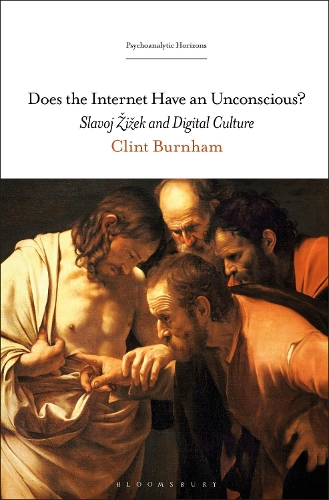
Does the Internet Have an Unconscious: Slavoj iek and Digital Culture
(Hardback)
Publishing Details
Does the Internet Have an Unconscious: Slavoj iek and Digital Culture
By (Author) Professor Clint Burnham
Bloomsbury Publishing PLC
Bloomsbury Academic USA
31st May 2018
United States
Classifications
Tertiary Education
Non Fiction
Western philosophy from c 1800
Media studies
Philosophy: aesthetics
199.4973
Physical Properties
Hardback
240
Width 140mm, Height 216mm
422g
Description
Does the Internet Have an Unconscious is both an introduction to the work of Slavoj iek and an investigation into how his work can be used to think about the digital present. Clint Burnham uniquely combines the German idealism, Lacanian psychoanalysis, and Marxist materialism found in ieks thought to understand how the Internet, social and new media, and digital cultural forms work in our lives and how their failure to work structures our pathologies and fantasies. He suggests that our failure to properly understand the digital is due to our lack of recognition of its political, aesthetic, and psycho-sexual elements. Mixing autobiographical passages with critical analysis, Burnham situates a iekian theory of digital culture in the lived human body.
Reviews
Clint Burnham does not merely apply psychoanalysis to the internet; he demonstrates how the unconscious itself is 'structured like the internet,' how our entanglement in the impenetrable digital web allows us to understand properly the way the unconscious overdetermines our thinking and activities. This is why Burnhams path-breaking book reaches much deeper than the usual analyses of the social and psychological implications of the internet: it does not just socialize and historicise the internet, it throws a new light on the unconscious itself. * Slavoj iek, Senior Researcher in the Department of Philosophy, University of Ljubljana, Slovenia, and author of Less Than Nothing: Hegel and the Shadow of Dialectical Materialism *
Clint Burnham has produced the definitive psychoanalytic account of digital culture. This is the book that those seeking to understand how the unconscious manifests itself in the digital universe have been waiting for. For too long, psychoanalytic theorists have confined themselves to analyses of film and literature, but now Burnham provides the breakthrough. Far from being an application of psychoanalysis to a foreign realm, the digital provides the privileged ground for encountering the unconscious. As Burnhams delightful and witty prose indicates, the internet functions as an event with concrete ramifications for the psyches that emerge in its wake. * Todd McGowan, Professor of English, University of Vermont, USA, and author of Only a Joke Can Save Us: A Theory of Comedy *
Were there ever two formations with less in common than 'the Internet,' a machinic transmission of discrete data, and 'psychoanalysis,' a wild science of messy social relationality Clint Burnhams genius is to show how psychoanalysis is indispensable to any robust theory of digital culture, but as well to reveal the cybernetics already at work in psychoanalytic theory from Freud to iek. In readings of multiple media, he vividly demonstrates the ongoing necessity of concepts like negation, enjoyment, and disavowal for making sense of aesthetic productions like cinema, social experiences like Facebook, and the cyber mode of production that binds online pleasures to offline battery factories. This is an expansive, fascinating book, offering its readers a dazzling plenty of speculation and critique. * Anna Kornbluh, Associate Professor of English, University of Illinois at Chicago, USA, and author of Realizing Capital: Financial and Psychic Economies in Victorian Form (2013) *
Author Bio
Clint Burnham is Professor of English at Simon Fraser University, Canada. He is the author of Fredric Jameson and The Wolf of Wall Street (Bloomsbury, 2016).
